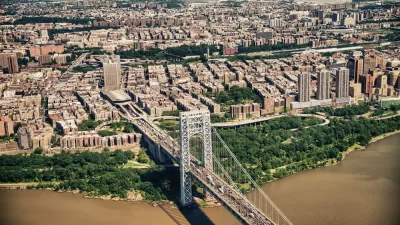Conservatives are becoming more visible within the smart growth movement; they differ in some ways both from liberal smart growth activists and from conventional conservatives.

There is finally a new blog, Smart Growth for Conservatives, focusing on issues of interest to those of us who generally support smart growth and new urbanism, and yet are less politically liberal than most people who do so.
How are conservative smart growthers (or CSGs) similar to their more liberal allies? Like environmentally minded critics of sprawl, CSGs oppose government subsidies for sprawl and sprawl-generating government regulations. In particular, quite a few of the new blog's posts focus on wasteful sprawl-generating road spending.
Having said that, CSGs do tend to differ from other smart growth supporters in a couple of ways. First, they tend to be fiscal conservatives, and thus skeptical of public amenities that are nice to have but perhaps not absolute necessities. As a result, they are less consistently supportive of public spending on public transit and pedestrian/bicycle facilities than liberals might be. Second, some issues that are generally part of today's liberal agenda are deemphasized by CSGs. In particular, CSGs are less likely to discuss climate change or social diversity than liberal new urbanists. I also suspect that CSGs are less likely to support smart growth regulations such as Oregon's growth boundaries; but since most Americans don't live in Oregon, CSGs aren't as obsessed with these regulations as are conventional pro-sprawl conservatives.
Of course, CSGs differ among themselves. Some CSGs are (as Mitt Romney might say) "severe" fiscal conservatives, and thus tend to be skeptical of all large-scale government expenditures. Personally, I am more of a Nixon Republican - which is to say, although I am less pro-regulation and egalitarian than many liberals, I am willing to support government spending not just as an "investment" (whatever that means) but as a public amenity akin to parks and schools.

Maui's Vacation Rental Debate Turns Ugly
Verbal attacks, misinformation campaigns and fistfights plague a high-stakes debate to convert thousands of vacation rentals into long-term housing.

Planetizen Federal Action Tracker
A weekly monitor of how Trump’s orders and actions are impacting planners and planning in America.

In Urban Planning, AI Prompting Could be the New Design Thinking
Creativity has long been key to great urban design. What if we see AI as our new creative partner?

Portland Raises Parking Fees to Pay for Street Maintenance
The city is struggling to bridge a massive budget gap at the Bureau of Transportation, which largely depleted its reserves during the Civd-19 pandemic.

Spokane Mayor Introduces Housing Reforms Package
Mayor Lisa Brown’s proposals include deferring or waiving some development fees to encourage more affordable housing development.

Houston Mayor Kills Another Bike Lane
The mayor rejected a proposed bike lane in the Montrose district in keeping with his pledge to maintain car lanes.
Urban Design for Planners 1: Software Tools
This six-course series explores essential urban design concepts using open source software and equips planners with the tools they need to participate fully in the urban design process.
Planning for Universal Design
Learn the tools for implementing Universal Design in planning regulations.
Gallatin County Department of Planning & Community Development
Heyer Gruel & Associates PA
JM Goldson LLC
City of Camden Redevelopment Agency
City of Astoria
Transportation Research & Education Center (TREC) at Portland State University
Jefferson Parish Government
Camden Redevelopment Agency
City of Claremont




























